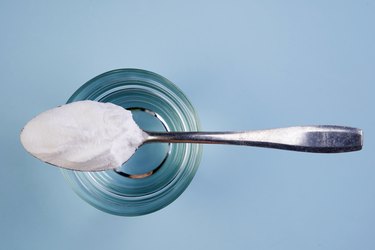
Bicarbonate of soda, commonly known as baking soda, has many household and health-related uses. It is sometimes even used as a remedy to help neutralize elevated potassium in the blood, a condition called hyperkalemia.
Read on to learn more.
Video of the Day
Video of the Day
Hyperkalemia Causes
According to the Cleveland Clinic, anyone can get hyperkalemia. However, kidney disease is often a factor. "Your kidneys filter potassium from the foods and drinks you consume," they explain. "Your body gets rid of excess potassium when you pee. With hyperkalemia, your body has too much potassium for your kidneys to remove. As a result, potassium builds up in your blood."
It makes sense that the most common causes of elevated potassium are conditions that affect the kidney's ability to filter excess potassium from the blood and into the urine. These conditions include acute and chronic kidney failure and obstructive causes of kidney disease, such as kidney stones and cysts.
Other conditions that increase the risk of high potassium include Addison's disease, alcoholism and diabetes.
Hyperkalemia Symptoms
The initial symptoms of elevated potassium are often mild and nonspecific. According to the National Kidney Foundation (NKF), "There are often no warning signs, meaning a person can have high potassium without knowing it."
Potassium is both a mineral and an electrolyte, as described by University of Michigan Health. It helps muscles and nerves work properly and keeps cell fluids balanced. It has a kind of teeter-totter relationship with sodium: As sodium levels go down, potassium levels go up — and vice versa.
Normal potassium levels are between 3.6 and 5. 2 millimoles per liter, according to the Mayo Clinic. Serum potassium levels higher than 6.0 millimoles per liter indicate a serious medical condition requiring immediate attention.
Even small changes in blood potassium levels can have significant health effects, says the NKF. Nausea, weakness and tingling or numbness in the extremities are a few of the milder symptoms of too-high potassium.
One of the most dangerous hyperkalemia complications is arrhythmias, or abnormal heart rhythms. These can cause dizziness, shortness of breath, chest pain and heart attack. Left untreated, even mild hyperkalemia can damage the heart.
Warning
Some athletes drink baking soda in water to increase muscular endurance, a dangerous practice called "soda loading." The NLM advises against soda loading, noting that sodium bicarbonate can be poisonous.
The Baking Soda Remedy
Treatment for hyperkalemia varies based on what's causing it. When elevated potassium results from too much acidity in the blood (a condition called acidosis), a baking soda remedy is sometimes prescribed. However, it's generally not the first choice of treatment, and isn't recommended for acute hyperkalemia specifically.
Bicarbonate of soda is commonly called baking soda because it is used as a leavening agent. However, it occurs naturally in all living things. Because sodium bicarbonate is alkaline, it helps organisms maintain the proper pH balance. It neutralizes the acidity of the blood by increasing the movement of potassium out of the blood and into the cells, according to the U.S. National Library of Medicine.
The Mayo Clinic notes that when sodium bicarbonate is prescribed as a medicine, the dosage will be different for different patients. The NLM cautions that it should be taken exactly as directed in order to avoid potentially dangerous side effects.
If you experience symptoms of hyperkalemia or acidosis — fatigue accompanied by nausea or vomiting, weakness and drowsiness — consult your physician before attempting the baking soda remedy yourself.
- Mayo Clinic: "High Potassium — Hyperkalemia"
- U.S. National Library of Medicine: "Sodium Bicarbonate"
- Cleveland Clinic: "Hyperkalemia (High Potassium)"
- National Kidney Foundation: "Facts About High Potassium in Patients with Kidney Disease"
- University of Michigan Health: "Potassium (K) in Blood Test"
- Mayo Clinic: "Sodium Bicarbonate (Oral Route, Intravenous Route, Subcutaneous Route)"
- U.S. National Library of Medicine: "Baking Soda Overdose"
Was this article helpful?
150 Characters Max
0/150
Thank you for sharing!
Thank you for your feedback!